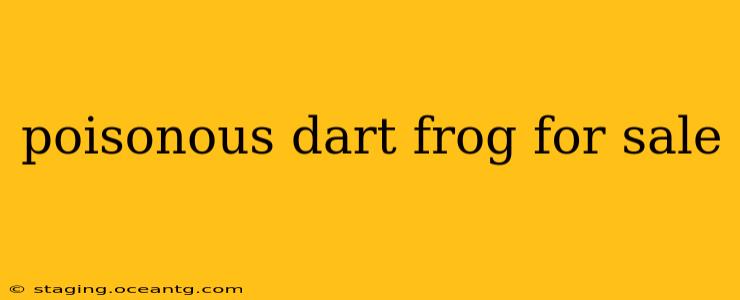The vibrant colors of poison dart frogs are undeniably captivating, making them popular choices for discerning herpetologists. However, before you even consider purchasing a poison dart frog, it's crucial to understand the significant responsibilities involved in their care. This guide will delve into the realities of owning these fascinating amphibians, addressing ethical considerations and providing essential information for potential owners. Buying a poison dart frog is a serious commitment; this guide aims to help you determine if you're truly prepared.
Are Poison Dart Frogs Legal to Own?
This is a crucial first question. The legality of owning poison dart frogs varies significantly by location. Some regions have strict regulations or outright bans on keeping these animals, while others may have permits or licensing requirements. Before even considering purchasing a frog, research your local and state laws thoroughly. Contact your local wildlife agency or department of natural resources to confirm the legality and any necessary permits. Ignoring these regulations can lead to significant fines or legal repercussions.
Where Can I Buy Poison Dart Frogs Responsibly?
Finding a reputable breeder is paramount. Avoid purchasing from unethical sources that may prioritize profit over the well-being of the animals. Reputable breeders prioritize the health and genetic diversity of their frogs, providing proper care and documentation. They'll also be knowledgeable and willing to offer advice and guidance to new owners. Look for breeders who:
- Prioritize the health of their frogs: Healthy frogs are active, alert, and have vibrant coloration.
- Can provide documentation: This may include lineage information or health records.
- Are willing to answer your questions: They should be able to discuss care requirements in detail.
- Are members of reputable herpetological societies: This often indicates a commitment to ethical breeding practices.
Avoid online marketplaces or individuals selling frogs without proper documentation or knowledge. These sources often lack ethical breeding practices and may sell sick or poorly cared-for animals.
What are the Specific Care Requirements for Poison Dart Frogs?
Poison dart frogs are not low-maintenance pets. They require a specifically designed and maintained vivarium to thrive. Key aspects of their care include:
- Vivarium Setup: A spacious, well-ventilated enclosure mimicking their natural rainforest habitat is essential. This includes appropriate substrate, humidity levels (typically 80-90%), and temperature gradients.
- Feeding: A varied diet of appropriately sized insects is crucial. Mealworms, crickets, fruit flies, and springtails are common food sources. Supplementing their diet with vitamins and minerals is also essential.
- Water: Fresh, clean water must always be available. Many species prefer a shallow dish or a gentle trickle of water.
- Cleaning: Regular cleaning of the vivarium is critical to prevent the buildup of harmful bacteria and parasites.
What is the Lifespan of a Poison Dart Frog?
The lifespan of a poison dart frog can vary depending on the species and the quality of care provided. Many species can live for 7-10 years or even longer in captivity with proper care. However, inadequate care can significantly shorten their lifespan.
How Much Does a Poison Dart Frog Cost?
The price of a poison dart frog can vary widely depending on the species, age, and the breeder. You can expect to pay anywhere from $30 to several hundred dollars for a single frog. Remember, the initial cost is only a small part of the overall expense. You must factor in the cost of the vivarium, equipment, substrate, food, and ongoing maintenance.
Are Poison Dart Frogs Poisonous to Humans?
While many species are known for their potent toxins in the wild, captive-bred poison dart frogs generally pose little to no risk to humans. Their toxicity is acquired through their diet of poisonous insects, which is not present in a controlled captive environment. However, it's still crucial to practice good hygiene and avoid touching your eyes or mouth after handling them.
Conclusion:
Owning a poison dart frog is a rewarding experience for dedicated and knowledgeable herpetologists, but it’s a significant commitment that demands thorough research and responsible ownership. By understanding the ethical considerations, legal requirements, and substantial care needs involved, you can make an informed decision and provide these magnificent amphibians with the environment they deserve. Remember, always prioritize the well-being of the animal above all else.
